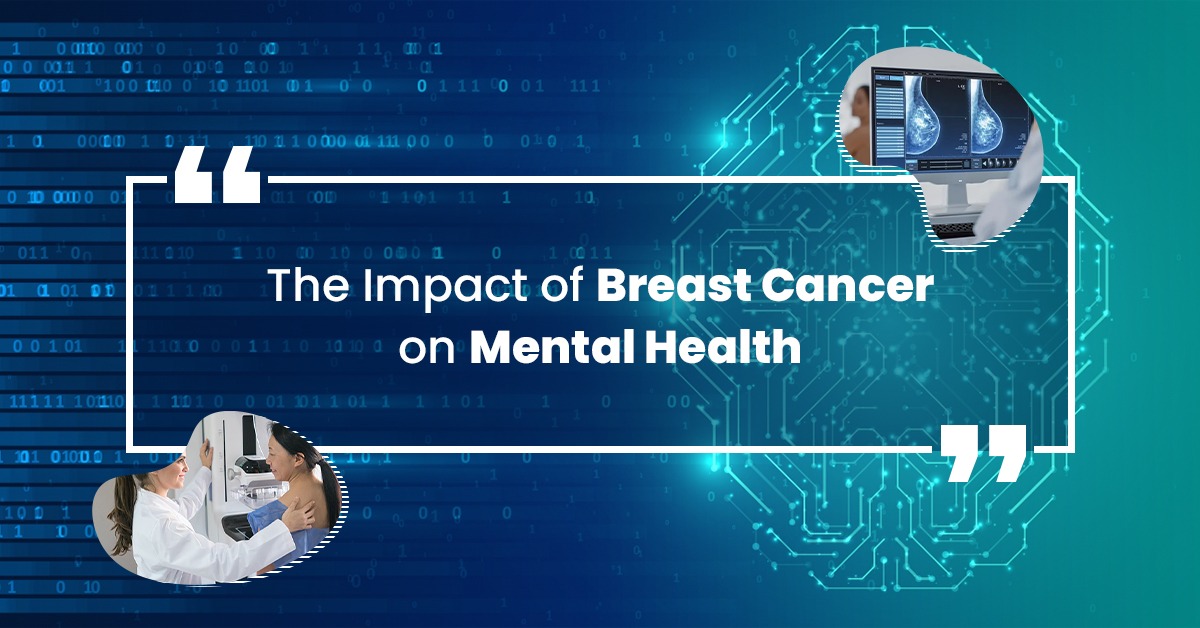Breast cancer is not just a physical illness; it deeply impacts the mental health of patients, influencing their emotional well-being and overall quality of life. A diagnosis of breast cancer can be overwhelming, leading to a range of psychological challenges that patients may face during treatment and beyond.
Common Mental Health Challenges
- Anxiety and Fear: The uncertainty in diagnosis, treatment outcomes, and the future can lead to heightened anxiety levels in breast cancer patients. Many experience fear and worry about the effectiveness of treatment.
- Depression: Feelings of sadness, hopelessness, and loss of interest in activities are common among breast cancer patients.
- Body Image Issues: Surgical procedures such as mastectomy or breast-conserving surgery, along with treatments like chemotherapy and radiation, can significantly alter a patient’s appearance. Coping with changes in body image and self-esteem can be challenging.
- Impact on Relationships: Breast cancer can strain relationships with family, friends, and partners. Patients may experience feelings of isolation, and loved ones may struggle with how to provide support.
- Coping with Treatment Side Effects: Physical side effects such as fatigue, nausea, and pain can exacerbate emotional distress. Managing these symptoms while undergoing treatment adds to the psychological burden.
Strategies for Coping and Support
- Seeking Emotional Support: Connecting with support groups, counseling services, or online communities can provide patients with a sense of belonging and understanding. Talking or connecting to others who have gone through similar experiences can be comforting.
- Maintaining Communication: Open and honest communication with healthcare providers, family members, and friends about feelings and concerns can help alleviate anxiety and foster a supportive environment.
- Mindfulness and Relaxation Techniques: Practices that are proven to reduce anxiety and stress such as mindfulness meditation, yoga, and deep breathing exercises can help patients manage stress and promote emotional well-being.
- Setting Realistic Goals: Breaking down larger goals into smaller, manageable tasks can provide a sense of accomplishment and control during treatment.
- Educational Resources: Understanding the disease, treatment options, and potential side effects can empower patients to make informed decisions and reduce anxiety about the unknown.
Here’s a table summarizing some key statistics related to the psychological impact of breast cancer:
| Statistic | Data |
| Prevalence of Anxiety and Depression | Up to 45% of breast cancer patients experience anxiety |
| Impact on Body Image | 60-70% of women report negative body image post-surgery. |
| Fear of Recurrence | A significant source of anxiety for 70-80% of survivors. |
| Effect on Relationships | 40-50% report strain in relationships during treatment. |
| Utilization of Support Services | Only 50% of patients utilize available support resources. |
| Benefits of Support Groups | Patients in support groups report higher quality of life. |
| Psychological Counseling Efficacy | Counseling reduces depression and anxiety symptoms. |
| Mindfulness and Stress Reduction | Mindfulness techniques reduce stress and improve coping. |
Conclusion
In conclusion, the psychological impact of breast cancer cannot be underestimated. It affects patients in profound ways, from emotional distress and anxiety to changes in self-perception and relationships. However, with the right support systems in place and effective coping strategies, patients can navigate these challenges more effectively.
References
- American Cancer Society. (2020). Breast Cancer and Emotional Health. Retrieved from https://www.cancer.org/cancer/breast-cancer/living-as-a-breast-cancer-survivor/emotional-health.html
- National Breast Cancer Foundation, Inc. (2020). Psychological and Emotional Effects of Breast Cancer. Retrieved from https://www.nationalbreastcancer.org/psychological-effects-breast-cancer
- Mayo Clinic. (2020). Breast Cancer: Symptoms and Causes. Retrieved from https://www.mayoclinic.org/diseases-conditions/breast-cancer/symptoms-causes/syc-20352470


